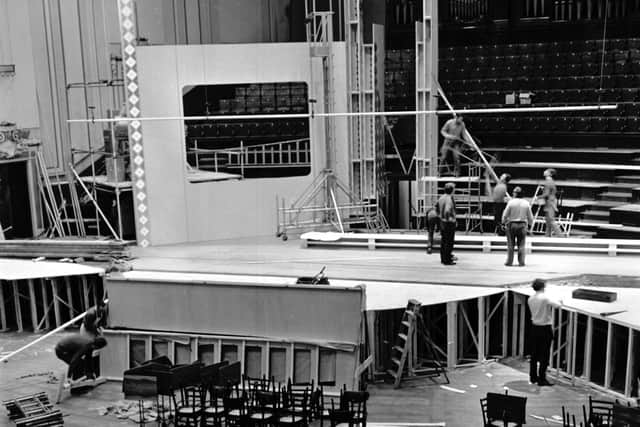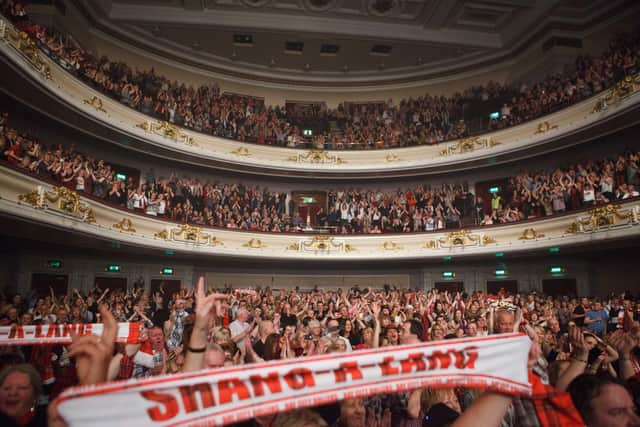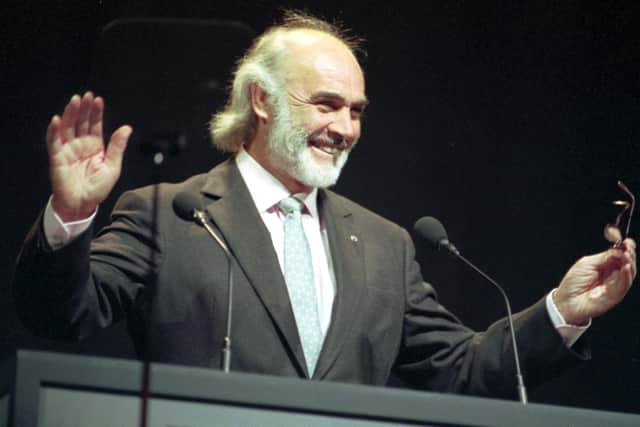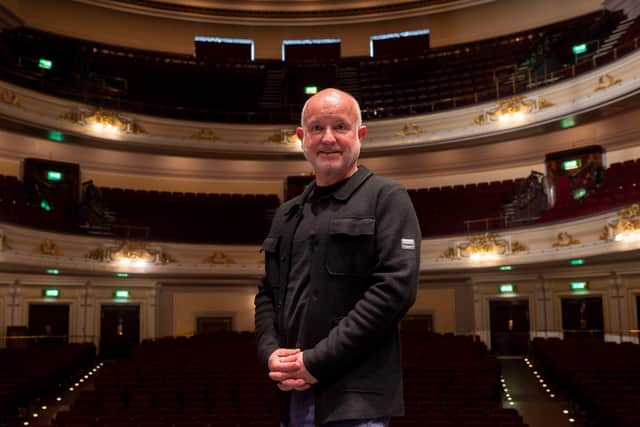From rock to pop and classical, Karl’s 20 year mission to ensure the Usher Hall is there for everyone in Edinburgh
and live on Freeview channel 276
Two decades later, in 1991, it was the venue for Sean Connery's Freedom of the City ceremony and more recently played host to the long-awaited reunion and homecoming of the Edinburgh boyband who took the world by storm in the Seventies, the Bay City Rollers.
Away from the world of entertainment, the Usher Hall has played a pivotal role in the life of the city. It was there in 1914, at a public meeting, that footballers from Hearts and Hibs famously signed up to fight with McCrae’s Battalion on the killing fields of the Western Front. It was there too, during WWII, that locals escaped enemy bombs - as I’m treated to a behind the scenes tour by Karl Chapman, the ghost signs from those days can still be seen in the labyrinth of corridors beneath the building that once acted as an air-raid shelter.
Advertisement
Hide AdAdvertisement
Hide AdKarl became General Manager of the Lothian Road venue 20 years ago. At the time he was a man on a mission; to return the venue, which had become decidedly high brow over time, to the people of Edinburgh. At its simplest, his aim was to attract back the generations of Capital youngsters who held fond members of singing there in the annual Edinburgh schools' choir competition.


Sitting in the stalls during what is only his fourth visit to the venue since lockdown began, Karl, now Cultural Venues Manager (the Assembly Rooms, Ross Bandstand and Church Hill Theatre have been added his remit), states, "My fundamental belief is that there is good music and that people should hear it. That good music comes in all forms and the Usher Hall is a civic venue, so it is there for everyone in the city.”
He recalls, "I remember at my interview, talking about democratising culture, mixing up the programme and diversifying it in a positive and relaxed way. People should feel completely comfortable having a great symphony one night, a rock or pop band the next and a community choir the night after.
"I don't think you can make a classical music programme matter to everybody, because it doesn't. I love classical music but I love jazz, rock and pop as well. My instinct is a lot of people are like that and, as a member of the public, you should feel that this is your venue and that there is something for you to see. People and music cross boundaries."
Advertisement
Hide AdAdvertisement
Hide AdIn the 17 years that Karl was responsible solely for the Usher Hall he certainly made his mark, bringing bands such as The Flaming Lips, Garbage, Erasure and The Human League to the venue, which remains the Edinburgh home of the RSNO and host to the International Festival.


He says, "Spending 20 years trying to diversify that programme I did get a bit of kickback from people saying, ‘This is a place for classical music’," he reveals, "My reply was that the Usher Hall is a place for everybody. When Andrew Usher built it, he didn't say it was a place for posh people or the elite, he said it was a place to hear good music and that is still on the front page of our business plan to this day."
During lockdown there’s been a dearth of live music, good or otherwise, although, unlike other cultural venues, the Usher Hall has managed to remain open, albeit for a very different purpose.
"In September, we became an NHS Covid Test Centre, so we've remained busy for obvious reasons and it has been good to be a part of the pandemic solution," he says, adding, “but a lot of my time has been spent rescheduling concerts, following the government guidelines on when we can reopen, and getting shows on sale for future dates... as we have discovered, this has gone on far longer than anyone anticipated."
Advertisement
Hide AdAdvertisement
Hide AdKarl has also spent much of that time liaising with both Scottish and Westminster governments, representing the interests of cultural venues across the UK.


"Our immediate reaction to the lockdown was to set up a group called Get Back to Live; that's ourselves, the Royal Albert Hall, SECC, Hydro and smaller promoters and venues as well. We all gelled as one to lobby on behalf of the sector while also working on the health and safety aspects of what we need in place to reopen. We've been doing that for quite a long time now so the plans are in place, the PPE is there, we've got the risk assessments and the guidance, we just need the people."
He continues, "We've been working with the Scottish Government as part of the cultural venues group, meeting fortnightly, and this week I am chairing the first Edinburgh Covid Operations Group, pulling together all the key cultural venues to look at a road map to getting places open in a way that the city and public understand."
He is confident the road map to reopening fully isn't too far away. "It's coming," he says, elaborating, "As it is today, we could seat 100 people, two metres apart, in the Usher Hall for an event. In a 2,200 capacity hall that's not a viable solution. When we get to Level Zero, we can have 400 people... so that is tough, but we are genuinely optimistic a road map with dates will emerge over the next few weeks."
Advertisement
Hide AdAdvertisement
Hide AdAdmitting it is difficult for government too, he adds, "But we do have to suppress the virus and we all have to do our part. However, as we see other sectors starting to open, those of us in the cultural sector are probably feeling a bit second class."


The autumn is when he expects the venue to have "some semblance of a full programme" again. He explains, "We’ve been rescheduling concerts and events so the diary is incredibly busy with some big shows in the autumn. I want those to go ahead. Just to have the energy of music coming from the stage again, that visceral energy that comes from seeing an orchestra and choir on stage, would be amazing. It just hits you."
One success story during the pandemic has been the Usher Hall's community choir, which has continued to meet online throughout.
"I actually joined it myself during lockdown," he beams, "and all 250 plus members are just itching to get back on stage. The kernel of the idea for our choir came from the number of people who said, 'I used to sing in my school choir at the Usher Hall and loved it but haven't been back since.'
Advertisement
Hide AdAdvertisement
Hide Ad"The choir was a direct response to that and came from a light bulb moment with Stephen Deazley, from Love Music, when we thought, 'Let's make it happen,' and so, that's our contribution... the UK's biggest community choir."
As Karl looks forward to reopening, so he also looks back, recalling some of the highlights of his 20 years in the hot seat.
"One of my favourite concerts was Christine and the Queens in 2019, she just blew the place apart. Another was when we had Adele here, she sang Someone Like You, or rather she got the audience to sing it. Even talking about it now I can feel the hairs on the back of my neck stand on end. Finally, a long time ago now, we brought the Radio Three Awards for World Music here, that was a really big coup. The atmosphere was amazing."
Thinking for a moment, he adds, "We also had a Romanian gypsy wedding band called Taraf de Haidouk here once. It was packed and at the end of the show they just walked through the audience and out the door, the show never really ended... They walked out into Lothian Road playing their instruments and the audience followed them, dancing."
Advertisement
Hide AdAdvertisement
Hide AdIt's unexpected moments like that Karl misses and he confesses that whichever concert reopens the Usher Hall, it's going to be emotional.
"I think I'm probably going to cry.... all that pent up energy and the emotion of experiencing music performed live again. It will just be amazing to have the energy of live music coming from the stage again."
A message from the Editor:
Thank you for reading this article. We're more reliant on your support than ever as the shift in consumer habits brought about by coronavirus impacts our advertisers.
If you haven't already, please consider supporting our trusted, fact-checked journalism by taking out a digital subscription
Comment Guidelines
National World encourages reader discussion on our stories. User feedback, insights and back-and-forth exchanges add a rich layer of context to reporting. Please review our Community Guidelines before commenting.